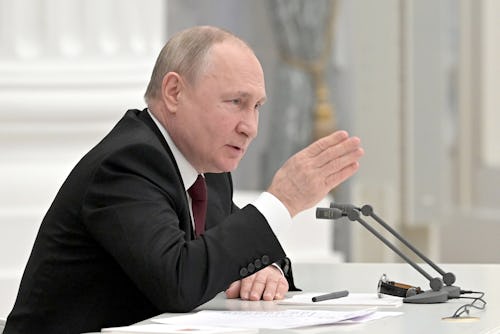Russia to recognize independent Ukrainian “republics” as potential prelude to war
By claiming the Donetsk and Luhansk regions are now independent “republics,” Vladimir Putin has set the stage for a potentially bigger conflict to come.

After weeks of speculation and posturing over whether or not Russia would launch a full-scale invasion of Ukraine, Russian President Vladimir Putin announced Monday that his country would recognize two contested regions in Eastern Ukraine as independent “republics,” in a move that signals the possibility of large scale military conflict to come.
Hours after informing the German and French governments of his plans to recognize the Donetsk and Luhansk regions of Eastern Europe — both strongholds of Russian-backed separatist militias since 2014— as their own independent entities, Putin confirmed the move on Russian state TV in a rambling, aggrieved monologue, making it clear he sees Ukraine as merely an extension of his own country, calling it “an inherent part of our history” that was “completely created by Russia.”
The move comes after a flurry of speculation that Russia might simply launch an outright invasion into Ukraine, after having massed tens of thousands of troops along its border with the country. However, by setting his sights on the two regions now marked by him as “republics,” it appears Putin might have more complex — if not ultimately equally destructive — machinations in mind. Unilaterally recognizing Donetsk and Luhansk as sovereign states affords him the ability to move Russian military forces into those areas specifically as ostensible support on behalf of the pro-Russian separatists there, while forgoing a full-scale invasion of Ukraine as a whole — for now. Not only would this give him a much stronger toehold in the region for any future military action, but it would also present other European nations and NATO allies a choice: Consider this a perverse form of de-escalation from the prospect of an immediate invasion, or treat the recognition and potential military push into the two zones as an act of war in and of itself.
Already the U.S. government has called any independent Russian recognition of Luhansk and Donetsk a “gross violation of international law” that would prompt a “swift” response, although at a White House press briefing earlier this month, Press Secretary Jen Psaki wouldn’t expand upon what that response might entail, saying only that “there’s a range of options we have at our disposal.” President Biden has previously affirmed that he would not send U.S. troops to Ukraine, although he has already shuffled American military assets across the region and begun supplying Ukraine’s government with military aide as part of the United States’s broader response to Russian aggression.
For the people living in the shadow of what could become the biggest armed conflict in Europe since World War II, however, Putin’s unapologetically imperial posturing, and NATO’s as-of-yet unclear response only injects more uncertainty into what has already been years of precariousness and violence. It’s they who will ultimately suffer the most, no matter what Russia and the United States and its NATO allies decide.